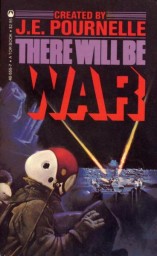 Military science fiction coalesced as a distinct form of fiction in the 1970s. Gordon R. Dickson showed the way with this “Dorsai” stories in Analog in the 1960s. Jerry Pournelle’s “CoDominion” stories in Analog and David Drake’s “Hammer’s Slammers” stories in Galaxy in the 1970s solidified a new genre.
Military science fiction coalesced as a distinct form of fiction in the 1970s. Gordon R. Dickson showed the way with this “Dorsai” stories in Analog in the 1960s. Jerry Pournelle’s “CoDominion” stories in Analog and David Drake’s “Hammer’s Slammers” stories in Galaxy in the 1970s solidified a new genre.
The first military science fiction anthology was probably Combat SF (Doubleday, 1975) edited by Gordon R. Dickson.
Jerry Pournelle edited probably the definitive military science fiction anthology series with There Will Be War in the 1980s. Now the series is back with a new volume from Castalia House.
The first There Will Be War was from January 1983 from Tor Books. Tor Books in the 1980s was the place for action/adventure science fiction. There was a steady stream of collections and novels from Poul Anderson, Ben Bova, Fred Saberhagen, John Dalmas etc.
The book contains 23 pieces: three poems, three non-fiction essays, and the rest of the contents are fictional stories. Three stories were new. The fictional contents are wide- ranging. You have David Drake, Jerry Pournelle, and Gordon R. Dickson. You also have a western from Saturday Evening Post by James Warner Bellah.
The take home point of the book is you have to have military defense. Civilization is kept safe by men willing to do acts of violence on your behalf.
Pournelle has introductions to each story. In the course of the book, he excoriates the concept of nuclear mutual assured destruction and Robert McNamara as the architect of the doctrine.
Poul Anderson’s “Marius” is set in France in the aftermath of WWIII. The pieces are being picked up and leaders of guerrilla movements are no longer needed. This story was originally from 1957 and somewhat naïve on the United Nations and global government.
“The Soviet Strategic Threat From Space” is a non-fiction piece that discusses satellite warfare as defense from ICBMs.
“Ender’s Game” from Orson Scott Card was later expanded into a novel and then a movie. This is the original story with idea of using kids to fight a war thinking they are playing video games.
I didn’t care for Spider Robinson’s “Overdose.” A stoned soldier in Vietnam defeats an alien invasion.
W. R. Yates “Diasporah” is one of the original stories set in Israel with a threat of Iranian nukes. This story is too close for comfort.
“His Truth Goes Marching On” is one of Pournelle’s stories set in the CoDominion universe with naïve recruits who volunteer to fight in backwater planet.
“Thor: Orbital Weapon System” is a piece of non-fiction which is fascinating. The idea is to have satellites armed with essentially guided metal projectiles. The speed of acceleration turns an ordinary piece of elongated metal into a devastating weapon when launched from space. The Chicoms start a missile barrage on Formosa, launch the projectiles to carpet bomb the area. A cheap game changing weapons system.
I had read about Philip K. Dick’s “The Defenders” years ago but never read the story until now. It seems out of the general theme of the anthology. Robots deceive humans underground that the Earth’s surface is a wasteland with Soviet and U.S. robots waging eternal war. Turns out the Earth is green and ready for habitation once the Soviets and Americans make peace.
Jerry Pournelle has a short essay on mercenaries and the danger of using them. This is introduction to David Drake’s “Ranks of Bronze.” This story was revolutionary at the time it came out. Andre Norton played around the edges of the idea Star Guard. Drake gave it the treatment it really needed. Roman survivors from the Battle of Carrhae are bought from the Parthians by aliens. The aliens use the Romans to fight low tech wars on primitive planets.
“Call Him Lord” by Gordon R. Dickson is a typical 1960s Analog story. The heir to a galactic empire returns to Earth for a three day undercover excursion. The purpose is to find the worthiness of the candidate.
“Quiet Village” by David McDaniel reminds me of The Walking Dead though there are no zombies. Post-apocalyptic villagers are terrorized by gangs called “Rats.” Scouts are hired to deal with the threat.
“Strategy of Technology” by Jerry Pournelle revisits Mutual Assured Destruction and makes the case for Mutual Assured Survival and how emerging technology might aid in that goal.
This is a good anthology. I am generally not keen on a mix of new and reprint fiction but Pournelle made it work. The problems from 1983 are still with us- the mentally unbalanced Kim dynasty in North Korea, the Pakistani A-Bomb, the potential for Iranian mullahs with missiles and atomic bombs, EMP terrorist attacks, cyber warfare from the People’s Liberation Army etc. It is still a dangerous world.
The kindle e-book version is available at Amazon for $4.99.
Please give us your valuable comment